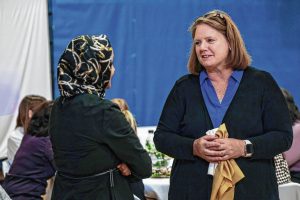
Two of the candidates vying for Indiana’s 6th Congressional District in the upcoming election are heading into the final stretch of the race with among the lowest amount of cash on hand of all U.S. House races in Indiana, according to new campaign finance filings.
Republican nominee Jefferson Shreve’s campaign reported $64,623 in cash on hand as of June 30, just 100 days before early voting starts in Indiana, according to new filings with the Federal Election Commission.
Democratic nominee Cynthia “Cinde” Wirth’s campaign reported $5,453 in cash on hand as of June 30, according to the FEC.
Libertarian nominee James Sceniak, of Johnson County, has not yet filed a report with the FEC.
Together, Shreve and Wirth reported a combined $70,076 in cash on hand as of the end of June.
By comparison, incumbent Rep. Frank Mrvan, D-Ind., and Republican nominee Randy Niemeyer are heading into the final stretch of the race for Indiana’s 1st Congressional District with a combined $1.9 million in cash on hand as of June 30.
Only the candidates running for the 3rd Congressional District and 5th Congressional District have reported less cash on hand than the 6th District nominees, though some U.S. House candidates in Indiana have not filed campaign finance reports yet, according to the FEC.
In the race for the Senate seat currently held by Republican Mike Braun, GOP nominee Rep. Jim Banks reported nearly $3.18 million in cash on hand as of June 30.
Banks’ opponent, Democratic nominee Valerie McCray, reported around $15,684 in cash on hand as of the end of June.
Shreve’s campaign, for its part, reported $136,300 in receipts between May 8 — the day after the GOP primary — and June 30, according to campaign finance filings. That includes $100,000 that Shreve contributed to his own campaign.
Since Shreve’s victory in the primary, his campaign has received contributions from leadership PACs sponsored by Sen. Todd Young, R-Ind.; House Speaker Mike Johnson; Rep. Rudy Yakym, R-Ind.; Rep. August Pfluger, R-Texas; and Rep. Jodey Arrington, R-Texas, according to the FEC.
Shreve’s campaign also has received contributions from Indianapolis-based health insurance company Elevance Health Inc., formerly known as Anthem Inc.; Chamber of Commerce of the United States of America PAC; and WinRed, the Republican Party’s online fundraising platform.
So far, the amount of money flowing into Shreve’s general election campaign has stood in stark contrast to his primary campaign, according to campaign finance records.
FEC filings show that Shreve reported contributing $5.68 million of his own money on his way to winning a crowded GOP primary after incumbent Rep. Greg Pence, R-Ind., decided not to seek reelection.
Shreve won the GOP primary for Indiana’s 6th Congressional District, with 28.4% of the vote, defeating six challengers, according to the Indiana Secretary of State’s Office.

Wirth’s campaign, for its part, reported $7,269 in receipts from May 8 to June 30, according to the FEC. Of those receipts, about half came from Wirth herself. The rest came from the general public.
Wirth ran unopposed in the Democratic primary.
Experts said political contributions generally pick up after nominees are confirmed following the primary and that the lack of money coming into the 6th District race so far may be partly due to neither of the major party nominees having Pence’s name recognition or the connections to donors through his brother, former Vice President Mike Pence, that may have been wanting to “continue to curry favor with the family that has been a political dynasty for a long time.”
“Particularly with (Mike) Pence being vice president (when Greg Pence ran for his first term in office), you’re going to have all those connections to every PAC that exists in the country. It seems like that’s going to be an easy thing for the brother to tap into,” said Aaron Dusso, associate professor of political science and Indiana University Indianapolis.
In addition, the lack of funds coming into the campaigns also may be an indication that PACs and other interests may not be anticipating a competitive race, or that some potential GOP donors feel that Shreve has deep enough pockets to fund his own campaign, Dusso said.
However, only time will tell how the elections play out, though the nomination of Vice President Kamala Harris as the Democratic presidential candidate could impact some down-ballot races in Indiana, particularly given the rise in straight-ticket voting in the state.
“I tend to think of Kamala Harris’ potential is more along the lines of Obama (in 2008), a historic candidate, and obviously Obama was able to break through in Indiana,” Dusso said. “…You could definitely see where, perhaps, Kamala would be able to do better here than … a lot of people would expect because she can energize a base of the party that often times needs a little extra oomph to show up. That can trickle down to a lot of these congressional or even state house races.”
This story is by Andy East of The (Columbus) Republic, a sister newspaper of the Daily Journal.




